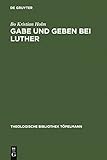Gabe und Geben bei Luther : Das Verhältnis zwischen Reziprozität und reformatorischer Rechtfertigungslehre / Bo Kristian Holm.
Material type: TextSeries: Theologische Bibliothek Töpelmann ; 134Publisher: Berlin ; Boston : De Gruyter, [2012]Copyright date: ©2006Description: 1 online resource (274 p.)Content type:
TextSeries: Theologische Bibliothek Töpelmann ; 134Publisher: Berlin ; Boston : De Gruyter, [2012]Copyright date: ©2006Description: 1 online resource (274 p.)Content type: - 9783110188394
- 9783110919332
- 234.7092 23
- BR333.5.J8
- online - DeGruyter
- Issued also in print.
| Item type | Current library | Call number | URL | Status | Notes | Barcode | |
|---|---|---|---|---|---|---|---|
 eBook
eBook
|
Biblioteca "Angelicum" Pont. Univ. S.Tommaso d'Aquino Nuvola online | online - DeGruyter (Browse shelf(Opens below)) | Online access | Not for loan (Accesso limitato) | Accesso per gli utenti autorizzati / Access for authorized users | (dgr)9783110919332 |
i-vi -- Vorwort -- Inhalt -- I. Luther und die Gabe -- II. Gemeinschaft und neues Leben. Ein rezeptionsgeschichtlicher Überblick -- III. Luthers Ringen mit der Ambivalenz der Reziprozität -- IV. „Selbsthingabe“ als Schlüsselwort im Galaterbriefkommentar von 1519 -- V. Die positive Verwendung der Reziprozitätsstruktur -- VI. Donum und sein Bedeutungsfeld. Rationis Latominanae confutatio -- VII. Göttliche Sozialität in der Wartburgpostille -- VIII. Doctrina et exhortationes. Die Begrenzung der Beschreibung -- IX. Zusammenfassung der Ergebnisse -- Literatur -- Register
restricted access online access with authorization star
http://purl.org/coar/access_right/c_16ec
Mit Hilfe des kulturanthropologischen Verständnisses von einer ‚Ökonomie der Gabe‘ (Reziprozität) wird anhand von Texten Martin Luthers - vor allem aus den Jahren zwischen 1518 und 1522 - gezeigt, wie dessen Rechtfertigungslehre ohne einen Gedanken der wieder etablierten Gegenseitigkeit zwischen Gott und Mensch gar nicht formulierbar ist. Luthers neu gewonnenes Verständnis von Gegenseitigkeit ist die Voraussetzung für sein positives Verständnis vom Christenmenschen und für seine häufige Parallelisierung von Christologie und Anthropologie.
The author uses the cultural anthropological understanding of an ‘economy of the gift’ (reciprocity) to show how in Martin Luther’s writings, especially between 1518 and 1522, his doctrine of justification cannot be formulated without the idea of a re-established mutuality between God and man. Luther’s newly-gained understanding of mutuality enables him to develop his positive understanding of the Christian person and for the frequent parallels he draws between Christology and anthropology.
Issued also in print.
Mode of access: Internet via World Wide Web.
In German.
Description based on online resource; title from PDF title page (publisher's Web site, viewed 28. Feb 2023)


